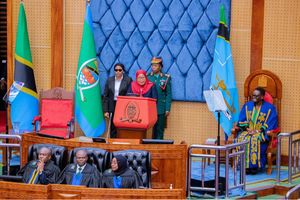TZ record on graft poor

What you need to know:
Rwanda, which is ranked 55 and the least corrupt country in Africa has been facing various security challenges including fighting rebels, dealing with refugees and many other related problems.
Dar es Salaam. Last week Transparency International released a report on Corruption Perceptions for 2014. Tanzania was ranked 119 along with Vietnam, Sierra Leone, Mozambique and Belarus. In East Africa Tanzania is the second least corrupt country after Rwanda.
It is quite clear that Tanzania is among African countries that are respected for having political stability, which involves peaceful leadership transition every five years.
The country is also referred to as an island of peace and home of refugees, who mostly flee from civil wars in their respective countries. Moreover, Tanzania is among African countries, which receive a lot of aid from both bilateral and multilateral donors.
The country was also hailed for its participation in the liberation struggle of Southern African countries in the 1960s and 1970s. Of late Tanzania is an active participant in the UN peace keeping missions in the DR Congo, Darfur, Lebanon and Abyei. The country has been praised for having a disciplined and competent army, political stability, which include respect for constitution as well as good governance.
However, things have been different when it comes to corruption.
Peace, political stability, democracy and good governance do not reflect the real situation on the ground when it comes to corruption related issues.
The just released report ranked Tanzania at 119 out of 175 countries surveyed in the study. Apart from enjoying peace and stability for more than 50 years since independence, the country is behind countries like Rwanda, which experienced genocide in 1994.
Rwanda, which is ranked 55 and the least corrupt country in Africa has been facing various security challenges including fighting rebels, dealing with refugees and many other related problems.
Another country above Tanzania is Burkina Faso, which is ranked 85. After the assassination of its charismatic leader Capt Thomas Sankara in 1987, Blaise Compaoré took over and led the country for 27 years.
According to analysts, Mr Compaore suppressed opposition, freedom of press and democracy.
In such kind of a situation, many expected rampart corruption owing to lack of transparency and inadequate democratic institutions that facilitate checks and balances. However, still Burkina Faso has done better than Tanzania.
Other countries, which experienced political instability and wars but still managed to fight graft include Mali and Cote d’lvoire which are both ranked 115, Liberia ranked 94 and Niger, which is ranked 103.
Tanzania position on Corruption Perceptions Index (CPI) has been changing from time to time, however, the country has rarely recorded good performance. In 2009, the country dropped from 102 position of 2008 to 126 position out of 180 surveyed countries.
The index examined indicators, such as the likelihood of bribery; the prevalence of bribery; the average size of bribes; the share of national bribery; and the impact of bribery.
It also examined the reasons for paying bribes, for reporting bribery incidents, and the public’s perception of corruption, along with other views of the fight against corruption.
The Prevention and Combating of Corruption Bureau (PCCB) Director General, Dr Edward Hosea reacted on the report saying: “These are just perceptions, they do not necessarily represent the real factual situation on the ground.”
He added that high perception of corruption is intensified by persistent, one-sided reporting of graft by the media, without showing what efforts the government was taking to curb corruption.
Dr Hosea said to gather data, Transparency International uses business people’s perceptions on whether the country is conducive for investment but that is not necessarily the best way to measure corruption in the country.
Commenting on why Tanzania performs poorly, analysts said the matter has something to do with patriotism and lack of a code of conduct.
A University of Dodoma lecturer (UDOM) Mr Paul Loisulie said the government lacks political will to curb corruption. He said most of government officials including law makers, decision and policy makers were among the beneficiaries of grand corruption.
According to Mr Loisulie, the ruling class was benefiting from the patronage system, which gives them opportunity to enrich themselves.
“Without political will and real commitment from leaders, it’s obvious there could be no achievement in war against graft in the country,” he said.
The University of Dar es Salaam lecturer, Mr Zachalia Malima said corruption was rampant in all sectors of the economy and public services in Tanzania to the extent that it has become part and parcel of daily life.
“It is estimated that more than 20 per cent of the national budget gets lost annually through corrupt practices including embezzlement, fraud, violation of procurement regulations, and questionable transactions.
Consequently, poor Tanzanians suffer because they have to dig deeper into their pockets for services which were supposed to be provided free of charge,” he said.
He said the war against corruption in Tanzania was difficult because there were people who receive bribes as a result of their meagre incomes and low standard of living.
He said: “These people solicit bribes for the purpose of making ends meet.”
Mr Malima added that lack of moral authority and political will were among major reasons that keep corruption alive in the country.
“This is due to the fact that many of the leaders managed to climb the leadership ladder through corruption, a factor which makes them ill-equipped to fight corruption,” said Mr Malima.
Rwanda dropped from 49 last year to 55 this year but maintained its status as the least corrupt country in East Africa.
At 119, Tanzania is the second least corrupt country in East Africa. Uganda follows at 142 and Kenya stands at 145. Burundi is the most corrupt country in the region at 159.
The 2014 Corruption Perceptions Index shows that economic growth is undermined and efforts to stop corruption fade when leaders and high level officials abuse power to appropriate public funds for personal gain, said José Ugaz, the chair of Transparency International.
“Corrupt officials smuggle ill-gotten assets into safe havens through offshore companies with absolute impunity,” Ugaz added. “Countries at the bottom need to adopt radical anti-corruption measures in favour of their people. Countries at the top of the index should make sure they don’t export corrupt practices to underdeveloped countries.”
More than two thirds of the 175 countries in the 2014 Corruption Perceptions Index score below 50, on a scale from 0 (perceived to be highly corrupt) to 100 (perceived to be very clean). Denmark comes out on top in 2014 with a score of 92 while North Korea and Somalia share last place, scoring just eight.
Tanzania has undergone a significant transformation since independence.
Now a multi-party democracy with strong economic growth, the government has taken a variety of steps towards good governance and anti-corruption through its National Anti-Corruption Strategy and Action Plan, says Samira who works as a Knowledge and Policy Officer the Anti-Corruption Helpdesk at Transparency International.
“While there is an established media and civil society presence, the government’s restrictions on freedom of press and association limit the role these stakeholders can play in the fight against corruption,” she adds.
She adds: “Against this backdrop, corruption is still rampant and is an issue of particular concern in the context of the country’s growing extractive industry.
Corruption both within the public and the private sector risks undermining any benefit that citizens can gain from the extraction of natural resources.”




